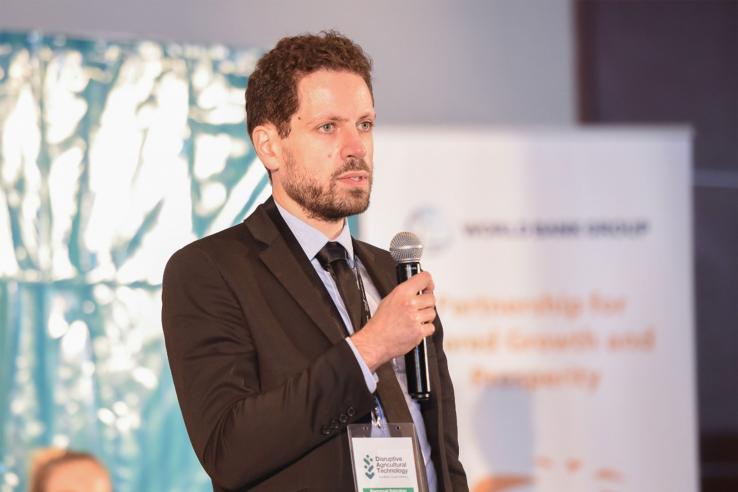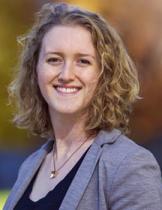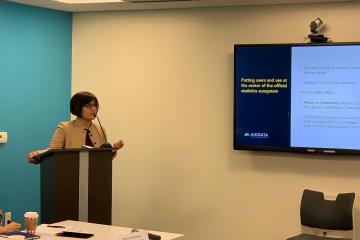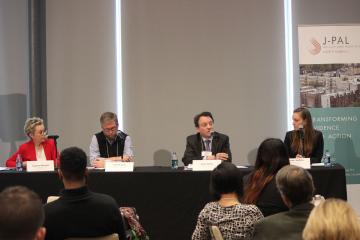
Emmanuel Bakirdjian, J-PAL ‘17, uses evidence to help farmers increase agricultural yield across East Africa

The Alumni Spotlight series highlights J-PAL alumni who are making an impact across industries and around the world. To nominate a J-PAL alum to be featured in a future Alumni Spotlight, please fill out this form.
In this installment of our Alumni Spotlight series, we caught up with Emmanuel Bakirdjian, a former senior research manager at J-PAL Africa. Emmanuel joined J-PAL Africa in 2012 and oversaw many of its research projects. Now the Africa Regional Director at Precision Agriculture for Development in Kenya, Emmanuel is leading an effort to help farmers across East Africa increase agricultural yields.
What drew you to the field of development?
I’ve always been interested in economics, so I studied it in high school and did my undergraduate studies in general economics. I then went on to specialize in development economics for my Master’s degree and was first exposed to development work through internships and travel.
I first heard about IPA when a former classmate of mine started working on a project in Rwanda. I became very interested and started applying for positions at IPA and J-PAL. I got an offer to join a project in Rwanda, and I was on a plane just a week later. As I think happens to a lot of field research associates, I was thrown right into the mix. There were some difficulties with the baseline survey, so I was troubleshooting right from the beginning of my job. It was actually quite fun!
You worked as a project associate at IPA in Rwanda and Sierra Leone, before joining J-PAL. Tell us a bit about your day-to-day and how you think it eventually prepared you for a research management role at J-PAL?
I really enjoyed working at IPA for two years. I’ve heard that people often get attached to the first country where they are based, and that was definitely the case for me. But the first project I worked on presented a lot of challenges. The survey company we worked with made a bad investment in survey scanning software, which set the project back and required me to learn new software fast in order to set up the data entry process from scratch. I also had to train a team of enumerators and data entry operators to upload the data.
The classmate who introduced me to this project managed the field work initially, and I was in charge of data entry. We did around eight or nine data collection rounds in less than two years. After a year, I was managing teams of enumerators and data entry operators at the same time. This meant that I spent a lot of time in the field accompanying the enumerators and visiting coffee farmers for our high frequency surveys, which I really enjoyed. I also enjoyed managing a very large team of enumerators and stayed in touch with them for a long time.
The management aspect of the position really prepared me for my role at J-PAL. From managing human resources for the team to managing survey firm relationships and making sure data collection was done correctly—all these management tasks trained me for a management role at J-PAL.
You went on to work at J-PAL Africa, first as a research manager and then as a senior research manager. Could you tell us about the projects you worked on?
I focused mainly on labor markets, but also did some work in financial literacy, health, urban services, early childhood development, and political participation. I worked on a total of twelve randomized evaluations, collaborating with a total of 24 primary investigators (PIs) over five years.
A favorite project of mine had to do with transportation subsidies for job seekers in Johannesburg. Many young people who are unemployed are unable to afford transportation to job interviews or because of the geographic spread of the city. The idea was to give these young people subsidized bus cards or vouchers that they can use to get to job interviews. We faced a lot of technical challenges with this intervention, but it was so relevant for policy and for helping to solve issues related to unemployment.
Another youth employment project I managed developed simple interventions—a reference letter template, for example—which proved to be very effective. Many jobseekers do not have recommendation letters or do not know how to go about getting them, and this intervention made it very simple for jobseekers to obtain them from past employers. It was very simple, just a piece of paper.
I found these projects to be particularly interesting because of their scale and potential relevance for policy. Transportation subsidies have been discussed at the government level—there are potential challenges in implementing them, but this is where research becomes particularly relevant. These particular interventions were designed so that the results could be relatively quickly taken to policymakers to inform decisions around scaling. In the end, it’s all about ensuring governments allocate their limited funding to the most cost-effective policies or the most impactful programs. I think it’s critical to work with organizations that spend time and resources on making sure we identify and develop interventions with high impact potential.
You currently work as the Africa regional director at Precision Agriculture for Development (PAD). Could you tell us about your current role?
After leaving J-PAL, I wanted to work for an organization that uses the same type of rigorous research methods to generate evidence, but was more focused on implementation of specific interventions, particularly in the agricultural sector given my interest in it, having started at IPA working on a coffee project. Many people living in Africa are dependent on the agricultural sector, so there is a lot to do in this area.
I work much longer hours now. PAD was very much a startup when I joined. There was a lot of infrastructure to build up, but it was a very exciting environment. Now I supervise our work in Kenya, Uganda, Rwanda, and Zambia. We are also exploring doing work in the Democratic Republic of the Congo. I supervise all our programs along with human resources and finance. It’s quite a demanding position, but it’s also very exciting and enriching. I’ve found that the scope for digital extension services is massive in Africa. More and more farmers are getting mobile phones, so there is a lot of potential to leverage them to increase yields for farmers across the continent.
How do you think Michael Kremer (PAD Co-Founder)'s Nobel Prize win has affected or will affect PAD’s direction and the work that you do?
I have yet to see what the long-term effects could be, but we are very excited to see that Michael’s and the other laureates’ research has been recognized. It’s an amazing recognition and we hope it will lead to higher level conversations with governments. I think this is going to fundamentally change the way we work. I’m hoping that it will encourage more funding and more work in the agricultural sector, and that we can continue to build on the work of the last decade.



